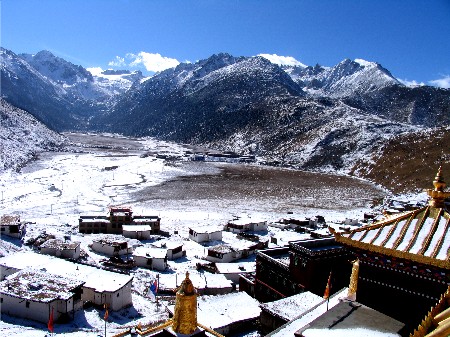Shri Singha Shedra: Difference between revisions
Jump to navigation
Jump to search
No edit summary |
No edit summary |
||
| (One intermediate revision by one other user not shown) | |||
| Line 1: | Line 1: | ||
[[Image:Dzshedra1.jpg|frame|'''Shri Singha Shedra in the distance below the mountains that surround Dzogchen Monastery''' photo courtesy of Matthew Pistono]] | [[Image:Dzshedra1.jpg|frame|'''Shri Singha Shedra in the distance below the mountains that surround Dzogchen Monastery''' photo courtesy of Matthew Pistono]] | ||
'''Shri Singha Shedra''' ([[Wyl.]] ''shrI simha bshad grwa'') — the famous [[shedra]] at [[Dzogchen Monastery]] founded by [[Gyalsé Shenpen Thayé]] in the nineteenth century<ref>Dreyfus (2005) p. 288 gives the year as 1848 </ref>, which produced many of the finest scholars in Tibet. Among the great masters who studied and/or taught at the shedra were [[Khenpo Pema Vajra]], [[Mipham Rinpoche]], [[Khenpo Shenga]], [[Khenpo Ngakchung]], [[Khenpo Kunpal]], [[Pöpa Tulku]] and [[Khenpo Tsöndrü]]. | '''Shri Singha Shedra''' (Tib. ཤྲཱི་སིམཧ་བཤད་གྲྭ, [[Wyl.]] ''shrI simha bshad grwa'') — the famous [[shedra]] at [[Dzogchen Monastery]] founded by [[Gyalsé Shenpen Thayé]] in the nineteenth century<ref>Dreyfus (2005) p. 288 gives the year as 1848 </ref>, which produced many of the finest scholars in Tibet. Among the great masters who studied and/or taught at the shedra were [[Khenpo Pema Vajra]], [[Mipham Rinpoche]], [[Khenpo Shenga]], [[Khenpo Ngakchung]], [[Khenpo Kunpal]], [[Pöpa Tulku]] and [[Khenpo Tsöndrü]]. | ||
==Notes== | ==Notes== | ||
| Line 7: | Line 7: | ||
==Further Reading== | ==Further Reading== | ||
*Dreyfus, Georges B. J. | *[[Dreyfus, Georges B.J.]], ''The Sound of Two Hands Clapping: The Education of a Tibetan Buddhist Monk''. Berkeley: University of California Press, 2003 | ||
*Dreyfus, Georges. “Where Do Commentarial Schools Come From? Reflections on the History of Tibetan Scholasticism” in ''Journal of the International Association of Buddhist Studies'' (Vol. 28, No. 2), 2005, pp. 273 – 297 | *Dreyfus, Georges. “Where Do Commentarial Schools Come From? Reflections on the History of Tibetan Scholasticism” in ''Journal of the International Association of Buddhist Studies'' (Vol. 28, No. 2), 2005, pp. 273 – 297 | ||
Latest revision as of 21:22, 29 March 2018

Shri Singha Shedra (Tib. ཤྲཱི་སིམཧ་བཤད་གྲྭ, Wyl. shrI simha bshad grwa) — the famous shedra at Dzogchen Monastery founded by Gyalsé Shenpen Thayé in the nineteenth century[1], which produced many of the finest scholars in Tibet. Among the great masters who studied and/or taught at the shedra were Khenpo Pema Vajra, Mipham Rinpoche, Khenpo Shenga, Khenpo Ngakchung, Khenpo Kunpal, Pöpa Tulku and Khenpo Tsöndrü.
Notes
- ↑ Dreyfus (2005) p. 288 gives the year as 1848
Further Reading
- Dreyfus, Georges B.J., The Sound of Two Hands Clapping: The Education of a Tibetan Buddhist Monk. Berkeley: University of California Press, 2003
- Dreyfus, Georges. “Where Do Commentarial Schools Come From? Reflections on the History of Tibetan Scholasticism” in Journal of the International Association of Buddhist Studies (Vol. 28, No. 2), 2005, pp. 273 – 297